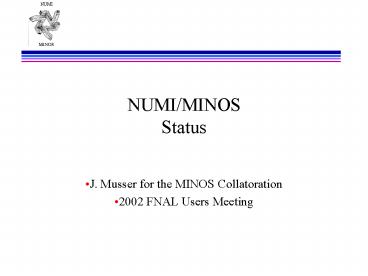NUMI/MINOS Status - PowerPoint PPT Presentation
1 / 31
Title: NUMI/MINOS Status
1
NUMI/MINOSStatus
- J. Musser for the MINOS Collatoration
- 2002 FNAL Users Meeting
2
Summary
- Quick summary of status of directly relevant
neutrino oscillation results. - Even quicker summary of MINOS physics reach.
- Status of construction at far and near sites.
- Results from CalDet test beam running
- Results from Far Detector commissioning and data
taking using cosmics. - Bottom Line Everything looking good!
3
SuperK Status (Neutrino 02)
4
SuperK nt Detection
5
3 Component Mixing
6
K2K Allowed Region
Far Detector event sample 56 FC events
7
MINOS Physics Goals
- Demonstrate presence of oscillations.
- A number of detection channels are available to
us. Best is comparison of near/far CC energy
spectrum. The beamline and detectors are designed
to do this with a total systematic error of lt 2
per 2 GeV bin. - Provide precision measurements of oscillation
parameters. - Provide determination of flavor participation to
2. - Comparison of oscillation parameters for
atmospheric neutrinos and antineutrinos.
8
CC Energy Distribution Channel
Note 10 kt. Yr. 2 live years of running.
Results still statistics limited at that time.
9
CC Energy Distribution -Based Limits and
Confidence Regions
10
nm-ne Mixing
MINOS will probe U13 in critical SuperK allowed
region. Off-axis measurements facilitate studies
of this channel.
11
Far Detector 5400 tons
Near Detector 980 tons
12
The Far Detector
- 8m octagonal steel scintillator tracking
calorimeter - Sampling every 2.54 cm
- 4cm wide strips of scintillator
- 2 sections, 15m each
- 5.4 kton total mass
- 55/?E for hadrons
- 23/?E for electrons
- 486 planes of scintillator
- 95,000 strips
13
The Near Detector
- 3.8 x 4.8m octagonal steel scintillator
tracking calorimeter - Sampling every 2.54 cm
- 4cm wide strips of scintillator
- 1 sections, 16.6m length
- 0.98 kton total mass
- 55/?E for hadrons
- 23/?E for electrons
- 282 planes of steel
- 153 planes of scintillator
- 11,616 strips
14
MINOS Active Detector
15
FarDet Plane Installation
Top view, showing fiber readout cables
Plane view, looking South
16
Far Detector Installation
- Planes are now being installed and checked out at
a rate of roughly 6 per week. This exceeds our
original installation rate estimates. - Next milestone Energizing the magnetic field on
the first Supermodule (1/2 far detector). This
takes place in July, and represents the halfway
point in far detector installation. - Commissioning and CR-based physics running on the
Far Detector is taking place during installation
- some results later in the talk.
17
Near Detector Construction
Scint. Modules Installed on Near Detector Plane.
Assembly Area in New Muon Lab
18
NUMI Tunnel and Hall Construction
Target Shaft Area
MINOS Shaft Area
Bulkheads
Decay pipe (546 ft of 2193ft)
MINOS Service
Target Service
Bldg
Beam Absorber Access Tunnel
1,250ft
600ft
225ft
2,193ft
MINOS
Service
Bldg
Target Service
.
EAV-1
EAV-23
EAV-4
Extraction Hall
MINOS Sump
Decay Tunnel
(216D 4walkway)
Beam Absorber
MINOS Hall Tunnel
Carrier Tunnel
(10 x 10)
MINOS Hall
Muon
Detectors
Target Hall
(35W x 32H x 150L)
(25W x 30-60H x 175L)
MINOS Near Detector
Excavated
Excavation Complete! Decay Pipe now being laid
in.
19
Tunnel Construction
Decay walkway forms on the right (5/2/02)
Work is proceeding on schedule. Should be
complete this fall.
20
Beam Component Testing and Construction
Horn 1 Prototype 8x106 Cycles
Horn 2 Out Conductor.
21
CalDet _at_ CERN
T11
Electronics and PMTs
Exposed to 1-3.5 GeV tagged electrons/hadrons in
T11 beam 60 planes (30X x 30Y) Far Detector
electronics used in FY 02 run. Future running
with near detector electronics, higher energies.
22
Low Energy Electron Events
Typical 2 GeV Electron Event.
23
MINOS Response to EM Energy Deposition
Signal (MIPs) vs. Beam Momentum
s2 vs. 1/Beam Momentum
Momentum
Momentum
Expected resolution, 23/?E constant term lt5
Preliminary
24
Hadronic Events in MINOS(CalDet Data)
Sample Pion Events
Sample Proton Events
Even Plane view
Odd Plane view
Strip
Relative Pulse Height
3.5 GeV
2 GeV
1 GeV
25
Hadron Energy Distributions
Pion MEU distributions
Proton MEU Distributions
1 GeV
1.6 GeV
1 GeV
1.6 GeV
2.5 GeV
2 GeV
2 GeV
2.5 GeV
3 GeV
3.5 GeV
3 GeV
3.5 GeV
26
CalDet Summary
- CalDet Preliminary results
- EM resolution 23, as expected
- Analysis of hadrons in progress
- Further analysis
- Tune MC
- Pattern Recognition
- More data in 2002-2003
- Higher energies
- Different electronics
27
Far Detector CR Data Running
Detector Commissioning and Performance
11 Variation (s) with over 60 of Production
Complete lt0.2 below 0.5 nominal light yield.
Muon Pulse Height Distribution. Average summed
signal is 10 pes/MIP. Average 1 MIP signal
has been stable to lt 0.5 since Feb.
28
Neutrino Events in the Far Detector
Plane transit times determined to 2 ns
m
1/beta
n
Up/down flux ratio 105 Data taken since Feb
29
1st Neutrino Event
30
2nd Neutrino Event
31
Conclusion
- Excellent progress is being made on all fronts
- Far Detector installation on schedule, now 50
complete - Near Detector plane construction 25 complete
- Excavation now complete at FNAL.
- Most/all drawing of beam components in hand
within 6 months - procurement and fabrication
underway. - CalDet and Far Detector data shows that detector
performance meets our design specifications. - Far Detector is online NOW as an atmospheric
neutrino detector. - On schedule to begin data taking first quarter
2005.































